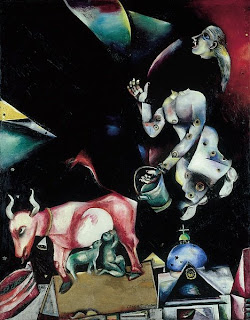Amigo Crítico, aquí tiene el texto:
* * *
Review/Theater; Fun and Games With Two Geniuses
Print
Save
By STEPHEN HOLDEN
Published: November 4, 1990, Sunday
Near the end of Dimitri Frenkel Frank's stimulating dramatic study of the life and times of Benedict Spinoza, the 17th-century Dutch philosopher and his friend Rembrandt van Rijn find themselves down and out in their home city of Amsterdam. Spinoza, the brilliant but rebellious free thinker, has been excommunicated by the local rabbinate for his heretical views. And Rembrandt, a high-living sensualist 27 years Spinoza's senior, is out of fashion as a painter, bankrupt and about to lose his house and possessions.
In a final meeting before Spinoza leaves Amsterdam, the philosopher and the painter have a discussion about values that reveals them to be polar opposites. When Rembrandt informs Spinoza that he is bankrupt, the philosopher, who has no strong ties to the material world, replies flippantly, "Is that all?" Spinoza's philosophy, boiled to down to four words, insists that "It's better to think." To which Rembrandt retorts, "It's better to feel -- you're too cold."
In the view of the playwright, who died two years ago at the age of 60, both have valid points to make, but Rembrandt may be closer to the truth. The drama, directed by Robert Kalfin at the Jewish Repertory Theater, is a respectful but detached portrait of the philosopher and theologian whose rationalist beliefs were too much even for a city as enlightened as 17th- century Amsterdam. Spinoza came from an affluent Jewish family that had fled the Portuguese Inquisition and settled in Calvinist Holland, which offered both religious freedom and commercial opportunity to Jews. Recognized early as an intellectual Wunderkind, the brilliant young scholar became a freethinker who began questioning the veracity of events in the Bible and spouting his rationalist concept of God with a vehemence that caused him to be deemed a threat to public order.
"Spinoza," which was originally performed in the Netherlands in 1964, is having its first American production. With its carefully structured dialogues woven into a historical framework that tries to give all points of view a fair hearing, the play is the product of an era when religious and ideological conflicts seemed simpler and less heated than they do today. And in Martin Cleaver's elegant but occasionally stiff translation from the Dutch, the debates have a high-flown aphoristic ring and clarity.
As written by Mr. Frank and portrayed by Diego Matamoros with a beady-eyed, darting impatience, the title character is an arrogant brat who is so consumed with his own brilliance that he is unable to comprehend the feelings of others. After a fling with an Italian countess (Pamela Burrell), who has also been Rembrandt's mistress, he unwittingly insults her with his icy analysis of the mechanics of desire.
Mr. Kalfin's production is true to the play in giving all the characters' points of view an equal weight. Mr. Matamoros's spiky performance is well balanced by W. B. Brydon's roaring, robust Rembrandt and by Salem Ludwig's quietly authoritative portrayal of the common-sensical, politically savvy rabbi who is pressured into excommunicating his star pupil.
Working in a small space, the director has done a workmanlike job of organizing a spare, handsome production in which miniature replicas of 17th- century architecture are used as both furniture and background decor on a checkerboard floor. But if the drama presents an absorbing intellectual portrait of a brilliant fanatic, some of its dramatic ingredients fail to jell. Most seriously, Rembrandt's chaotic battles with his wife, Hendrickje, (Karen McLaughlin), erupt without adequate preparation or explanation.
"Spinoza" is too schematic a play of ideas for the passions of its characters to engage the audience very deeply. Yet its view of the interactions of the workaday world and its unruly geniuses is astute and well-balanced enough to make its intellectual crossfire consistently interesting. SPINOZA By Dimitri Frenkel Frank; translated by Martin Cleaver; directed by Robert Kalfin; sets, Richard Hoover; costumes, Gail Cooper-Hecht; lights, John Gisondi; composer, John Clifton; stage manager, Nina Heller. Presented by Jewish Repertory Theater, Ran Avni, artistic director; Edward M. Cohen, associate director. At 344 East 14th Street. Spinoza . . . Diego Matamoros Rembrandt . . . W. B. Brydon Rabbi Saul Levi Morteira . . . Salem Ludwig Italian Countess . . . Pamela Burrell Hendrickje . . . Karen McLaughlin Zacuto . . . Jeffery Logan Magistrate . . . William Duff-Griffin Polish Girl . . . Funda Duyal






«El más antiguo ‹Más antiguo 201 – 253 de 253